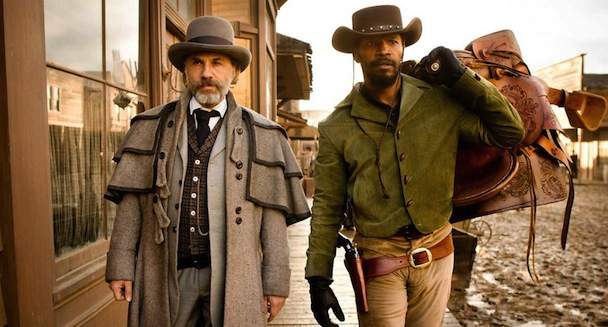Django Unchained
If you've even the smallest creative bone in your body, Django Unchained will tickle it.
Overview
If you've even the smallest creative bone in your body, Django Unchained will tickle it. Wildly creative, funny, and frightening, true to form yet never predictable, this is one of those films that makes you want to write one of these kinds of films.
Set two years before the start of the American Civil War when slavery was still rampant in the south, it's tempting (if also stupid) to think of Django Unchained as some sort of bizarre prequel to Spielberg's Lincoln. Initially the eponymous Django (Jamie Foxx) walks wearied and defeated in a chain gang until he's unexpectedly freed by the eccentric dentist Dr King Schultz (Christoph Waltz). This mannerly yet murderous bounty hunter then offers Django the chance to both exact revenge and make his fortune by murdering white outlaws in exchange for money. With the crosshatched scars of countless lashings on his back a daily reminder of such men's cruelty, Django leaps at the chance and soon proves a natural in the business. His wife, however, remains the property of vile plantation owner Calvin Candie (Leonardo DiCaprio), a character so heinous and sadistic that Tarantino subsequently deemed him 'beyond redemption', and hence a rescue plan takes form.
It's perhaps no surprise, then, that this Tarantino tale of slavery and vengeance dials the violence up to 11 from almost the opening scene and never looks back. It does occasionally border on 'look-away' levels of horror; however — just as it was with Inglourious Basterds — this 'revenge porn' sub-genre of cinema uncomfortably satisfies through its savagery. Moreover, Tarantino's preparedness to brutally kill off any (and, often, all) his principal characters without even a moment's notice lends every scene an undercurrent of unpredictable tension that commands your attention.
Traditionally, Tarantino's main shortcoming as a director has been his fondness for playing with form in a manner that denies his audiences the opportunity to entirely immerse themselves in the experience. Whether through unexpected soundtrack choices, mid-movie title sequences or just direct conversations with the audience, you're aware you're watching a movie and hence sit entertained but not always engrossed. Those same elements are at play again in Django, but for the first time since Kill Bill, they advance and enhance the plot rather than specifically (and jarringly) draw your attention to it. In short, it's a delightful return to form.





